These rumors get very lurid — we’re talking illegal sex stuff lurid.

Moderators: Elvis, DrVolin, Jeff
These rumors get very lurid — we’re talking illegal sex stuff lurid.

Boris Johnson says UK told Trump Russia was behind hacking
By Associated Press January 10 at 10:16 AM
LONDON — Foreign Secretary Boris Johnson says Britain told U.S. President-elect Donald Trump and his team that Russia “is up to all sorts of very dirty tricks, such as cyber-warfare” and was behind hacking during the presidential election.
Trump has expressed skepticism about links between Russia and the hacking.
Johnson says “it’s pretty clear” that hacking of Democrats’ emails “came from the Russians.”
However, he said, “it would be folly for us further to demonize Russia or push Russia into a corner.”
Johnson, just back from meeting Trump aides and Congressional leaders in the U.S., told lawmakers in the House of Commons on Tuesday that the talks had been “extremely productive.”
He said “there is a wide measure of agreement between the U.K. and the incoming administration about the way forward.”
Copyright 2017 The Associated Press. All rights reserved. This material may not be published, broadcast, rewritten or redistributed.
https://www.washingtonpost.com/world/eu ... b7ec569cbf
Flynn isn’t helping Trump on Russia
By Jennifer Rubin January 9
President-elect Donald Trump named retired Lt. Gen. Michael Flynn his national security adviser on Nov. 18, but Flynn has a history of making incendiary and Islamophobic statements that have drawn criticism from his military peers. (Peter Stevenson/The Washington Post)
All presidents suffer from a shortage of bearers of straight talk. Few aides want to jeopardize their standing with the president by raising objections and inconvenient facts. And while it is true that presidential aides generally figure out how to accomplish the president’s aims, at critical times they must tell him what he cannot do or what he must do. Those who don’t may provide short-term comfort to the president, but they damage him in the long run.
President-elect Donald Trump’s Russia troubles perfectly encapsulate this phenomenon. The failure of his designated national security adviser, Mike Flynn, to adequately prepare Trump to anticipate devastating intelligence findings about Russia (which Trump did not dare criticize directly) and, more generally, to project strength in his approach to Russia have severely damaged Trump’s image as a competent, resolute commander in chief. Even if one wants better relations with Russia (we think that ignores reality, but the president is entitled to try where other presidents have failed), the incessant defense of Russian motives coming from Trump and his transition team hardly makes sense. (Surely Flynn knows that Vladimir Putin respects strength.) Moreover, the Flynn-Trump tone on Russia and with regard to the intelligence community that will serve Trump has cast doubt on the incoming commander in chief’s judgment and even loyalty to U.S. interests.
As Max Boot points out, “Trump, however, doesn’t offer the slightest objection to Russia’s egregious misconduct, and that in turn raises the question of why not? Is it simply admiration for the Russian dictator on the part of a president-elect who has said in the past that Putin’s Russia is ‘hot stuff’ and that ‘what he’s done for Russia is really amazing’? Or is there something more sinister going on?” Or does his erratic national security adviser, who might harbor resentment toward former intelligence superiors (who sacked him), encourage Trump’s worst instincts?
Flynn publicly echoes Russian propaganda that Russia and the United States have aligned interests in fighting the Islamic State. Flynn’s frequent appearances on RT and defense of Russia’s international conduct more generally (“We cannot make Russia an enemy. Russia is a nation that is deeply involved in the Middle East right now,” he told an incredulous MSNBC host) put him at odds with the intelligence community, both sides of the aisle in Congress, our allies, virtually every other Trump foreign policy adviser and, to be blunt, reality.
Flynn, as the closest adviser on national security, should be in a position to explain the Russian threat to Trump. He should be able to explain that Russian aggression in Ukraine and the Middle East works against U.S. interests. In fact, Flynn wrote a book sharply critical of Russia:
In his 2016 book, “The Field of Fight,” Flynn wrote that Russia was part of an “enemy alliance” in league with Iran. “They are certainly not ‘fighting terrorists’ in the Middle East,” Flynn wrote of Russia’s actions in Syria. He also said “there is no reason to believe Putin would welcome cooperation with us,” noting the Russian military was establishing new military bases on its western border and modernizing its nuclear arsenal. “These are not the actions of a country seeking détente with the West,” he wrote, adding, “Putin fully intends to do the same thing as, and in tandem with, the Iranians: pursue the war against us.”
That’s all gone by the wayside. Instead, he feeds on Trump’s paranoia about the intelligence community, avoids any remarks about Putin (for example in the statement following Trump’s intelligence briefing) and any direct criticism of Putin, and sets NATO countries’ teeth on edge by downgrading concerns about Russia. Trump’s closest advisers, even those not directly involved in national security, must see that Flynn has contributed to the impression that Trump is more aligned with Putin than with bipartisan, long-held American security objectives.
Either Flynn’s judgment has become hopelessly distorted by his past career failure, or he thinks genuflecting toward Russia will endear him to Trump — or both. Either way, his actions make a successful presidency less likely. One need only see how Flynn’s adversarial relationship with the intelligence community has now transferred to his boss. Trump and the country would be better served by someone whose personal agenda and career ambitions do not contribute to presidential embarrassment and controversy.
https://www.washingtonpost.com/blogs/ri ... 8dc4d15bba
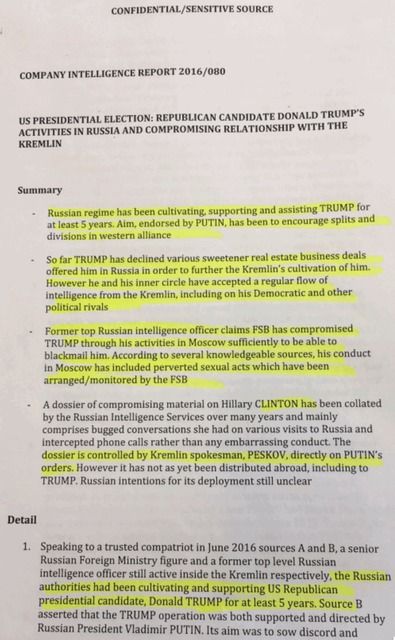
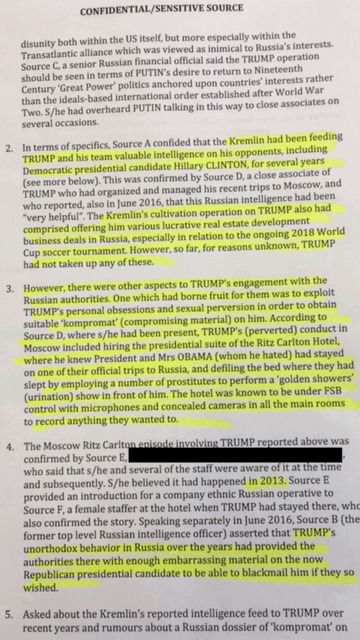
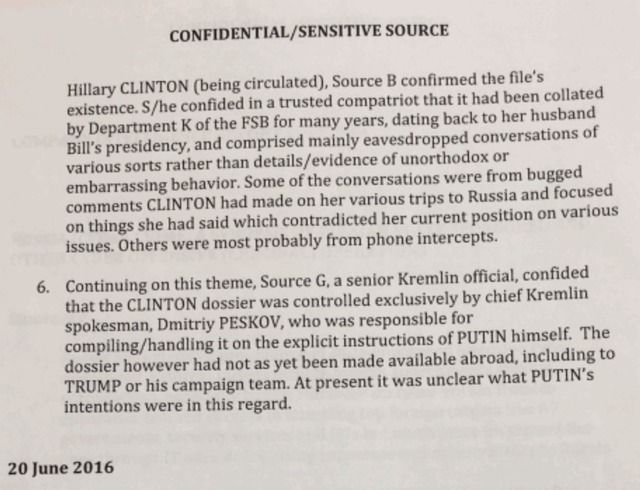
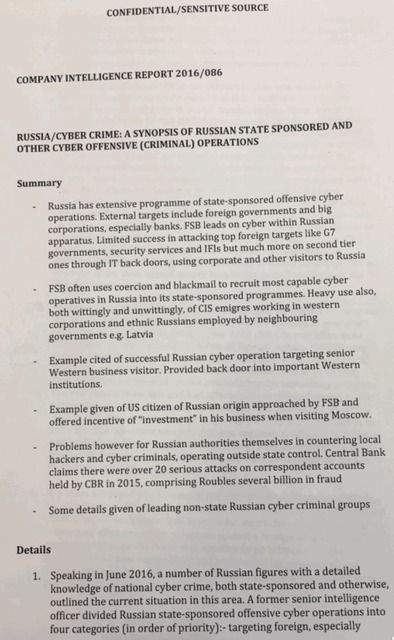
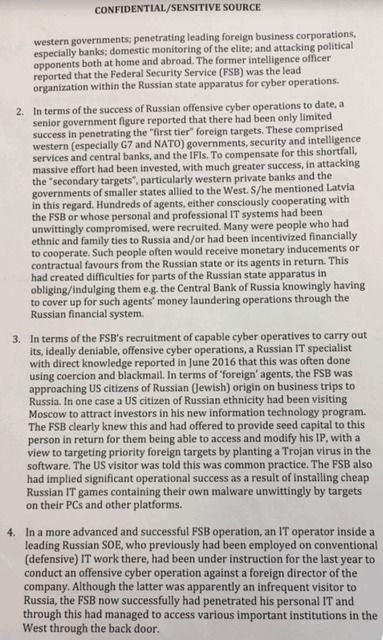







The report also alleges a bribe offered to Trump, via his adviser Page, by a “close associate” of Igor Sechin, one of Putin's closest confidants in the Kremlin and a strongman from the security and intelligence services. The alleged bribe was offered in July 2016 in exchange for the lifting of U.S. sanctions.
Today, Sechin is the president and CEO of Rosneft, Russia'a state-owned oil company partially blacklisted by the U.S. Treasury Department for its role in the invasion and occupation of Ukraine.
“SECHIN’s associate said that the Rosneft President was so keen to lift personal and corporate western sanctions imposed on the company, that he offered PAGE/TRUMP’s associates the brokerage of up to a 19 per cent (privatized) stake in Rosneft in return. PAGE had expressed interest and confirmed that were TRUMP elected US president, then sanctions on Russia would be lifted.”
Trump's attorney Michael Cohen maintained a “secret liaison” with the Russian leadership, the report alleges, especially related to trying to “cover up” the scandal of U.S. press disclosures about the closeness of Page and former campaign manager Paul Manafort to the Kremlin.
On Tuesday night, Cohen called those allegations "so ridiculous" and "silly."
The Guardian reported Tuesday night that the FBI applied for a warrant from the Foreign Intelligence Surveillance Court last year to monitoring four individuals on Trump’s team who were suspected of irregular contacts with officials in Russia. The court initially turned down the request as overly broad, and it’s unclear if the FBI was granted the warrant.
http://www.thedailybeast.com/articles/2 ... -next.html
It’s hard to imagine Tillerson publicly chiding Putin today because he is now so very dependent on that friendship. In 2011, he negotiated a multibillion-dollar deal between Exxon Mobil and Rosneft, the Russian state oil giant cobbled out of Khodorkovsky’s seized empire and run by Putin's former KGB buddy, Igor Sechin. The deal would have allowed Exxon access to the Russian Arctic shelf—which, according to U.S. government estimates, is thought to contain some 22 percent of the world’s undiscovered oil and gas deposits—in exchange for helping Rosneft, which didn’t have the technological capabilities, drill for the stuff.
In 2014, Russia invaded Ukraine, seized the Crimean peninsula and started an insurgency in Eastern Ukraine, triggering a wave of American and European sanctions. But that summer, Tillerson thought it best to stay away from the St. Petersburg Economic Forum and instead sent his deputy, who, acting on behalf of Exxon Mobil, signed another energy deal with Rosneft and Sechin, who had ended up under sanctions. The deal would expand Exxon-Rosneft offshore drilling in the Arctic Ocean, explore for shale oil in Siberia, and cooperate on a liquefied natural gas plant in the Russian Far East. Other energy companies signed similar deals, and Total’s CEO told journalists at the Forum, “My message to Russia is simple—it is business as usual.” Even Dudley, who had fled Russia and “sustained harassment” six years prior, said, “We have a responsibility to stand with our partners in a difficult time.”
http://www.politico.com/magazine/story/ ... end-214515
This Island Holds the Secret to Rex Tillerson and Vladimir Putin’s Relationship
Geoffrey Smith
If Vladimir Putin has a man crush on anyone in business, it's probably Rex Tillerson, the ExxonMobil chief executive Rex Tillerson Trump just nominated to head the State Department.
As to the reason why, all you need to do is look at Sakhalin, a windswept, earthquake-prone island off Russia's Pacific coast where temperatures can fluctuate 110 degrees throughout the year. It's this forbidding territory that Exxon (XOM, -1.28%), under Tillerson, has turned into one of Russia's most lucrative oil provinces, affording Russia a crucial entry into the fast-growing oil markets of Asia, generating nearly $5 billion in tax dollars and other revenue for the government to date, and generally being, by Moscow's lights, a good corporate citizen.
The Kremlin Doesn’t Like The Senate’s Push for New Sanctions
The project's three fields, Chayvo, Odoptu, and Arkutun Dagi, produce some 100,000 barrels of oil a day in temperatures that drop to nearly 50 degrees below zero. Although the oil reservoirs are offshore, the biggest drilling rig was built onshore to protect it from freezing seas. To reach the oil, it has had to drill horizontally up to 8 miles out below the seabed, setting one world record after another for the longest wells ever drilled. Technologically, it is one of the most stunning achievements of the hydrocarbon age (even if the newest of the three fields has had some problems this year, according to Russian media).
http://fortune.com/2016/12/14/this-isla ... ationship/
DrEvil » Mon Nov 21, 2016 8:36 pm wrote:Playtime is over
By Charlie Stross
So I've had a week now for the outcome of last Tuesday's US election to sink in, and I've been doing some thinking and some research, and my conclusion is that either I'm wearing a tinfoil hat or things are much, much worse than most people imagine.
Nearly four years ago I wrote about the Beige Dictatorship, and predicted:
Overall, the nature of the problem seems to be that our representative democratic institutions have been captured by meta-institutions that implement the iron law of oligarchy by systematically reducing the risk of change. They have done so by converging on a common set of policies that do not serve the public interest, but minimize the risk of the parties losing the corporate funding they require in order to achieve re-election. And in so doing, they have broken the "peaceful succession when enough people get pissed off" mechanism that prevents revolutions. If we're lucky, emergent radical parties will break the gridlock (here in the UK that would be the SNP in Scotland, possibly UKIP in England: in the USA it might be the new party that emerges if the rupture between the Republican realists like Karl Rove and the Tea Party radicals finally goes nuclear), but within a political generation (two election terms) it'll be back to oligarchy as usual.
Well, I was optimistic. The tea party radicals have gone nuclear, but I wasn't counting on a neo-Nazi running the White House, or on the Kremlin stepping in ...
Let me explain.
A few years ago, wandering around the net, I stumbled on a page titled "Why Japan lost the Second World War". (Sorry, I can't find the URL.) It held two photographs. The first was a map of the Pacific Theater used by the Japanese General Staff. It extended from Sakhalin in the north to Australia in the south, from what we now call Bangladesh in the west, to Hawaii in the east. The second photograph was the map of the war in the White House. A Mercator projection showing the entire planet. And the juxtaposition explained in one striking visual exactly why the Japanese military adventure against the United States was doomed from the outset: they weren't even aware of the true size of the battleground.
I'd like you to imagine what it must have been like to be a Japanese staff officer. Because that's where we're standing today. We think we're fighting local battles against Brexit or Trumpism. But in actuality, they're local fronts in a global war. And we're losing because we can barely understand how big the conflict is.
(NB: By "we", I mean folks who think that the Age of Enlightenment, the end of monarchism, and the evolution of Liberalism are good things. If you disagree with this, then kindly hold your breath until your head explodes. (And don't bother commenting below: I'll delete and ban you on sight.))
The logjam created by the Beige Dictatorship was global, throughout the western democracies; and now it has broken. But it didn't break by accident, and the consequences could be very bad indeed.
What happened last week is not just about America. It was one move—a very significant one, bishop-takes-queen maybe—in a long-drawn-out geopolitical chess game. It's being fought around the world: Brexit was one move, the election and massacres of Dutarte in the Philippines were another, the post-coup crackdown in Turkey is a third. The possible election of Marine Le Pen (a no-shit out-of-the-closet fascist) as President of France next year is more of this stuff. The eldritch knot of connections between Turkey and Saudi Arabia and Da'esh in the wreckage of Syria is icing on top. It's happening all over and I no longer think this is a coincidence.
Part of it is about the geopolitics of climate change (and mass migration and water wars). Part of it is about the jarring transition from an oil-based economy (opposed by the factions who sell oil and sponsor denial climate change, from Exxon-Mobil to the Kremlin) to a carbon-neutral one.
Part of it is the hellbrew of racism and resentment stirred up by loss of relative advantage, by the stagnation of wages in the west and the perception that other people somewhere else are stealing all the money—Chinese factories, Wall Street bankers, the faceless Other. (17M people in the UK have less than £100 in savings; by a weird coincidence, the number of people who voted for Brexit was around 17M. People who are impoverished become desperate and angry and have little investment in the status quo—a fancy way of saying they've got nothing to lose.)
But another big part of the picture I'm trying to draw is Russia's long-drawn out revenge for the wild ride of misrule the neoconservatives inflicted on the former USSR in the 1990s.
Stripped of communism, the old guard didn't take their asset-stripping by neoliberals during the Clinton years lying down; they no more morphed into whitebread Americans than the Iraqis did during the occupation. They developed a reactionary playbook; a fellow called Alexander Dugin wrote The Foundations of Geopolitics, and it's been a set text in the Russian staff college for the past two decades. A text that proposes a broad geopolitical program for slavic (Russian) dominance over Asia, which is to be won by waging a global ideological war against people like us. "In principle, Eurasia and our space, the heartland Russia, remain the staging area of a new anti-bourgeois, anti-American revolution. ... The new Eurasian empire will be constructed on the fundamental principle of the common enemy: the rejection of Atlanticism, strategic control of the USA, and the refusal to allow liberal values to dominate us. This common civilizational impulse will be the basis of a political and strategic union."
I don't want to sound like a warmed-over cold warrior or a swivel-eyed conspiracy theorist. However, the authoritarian faction currently ascendent in Putin's Russia seem to be running their country by this book. Their leaders remember how the KGB (newly reformed last month) handled black propaganda and disinformation, and they have people who know how new media work and who are updating the old time Moscow rules for a new century. Trump's Russian connections aren't an accident—they may be the most important thing about him, and Russia's sponsorship of extreme right neo-fascist movements throughout Europe is an alarming part of the picture. China isn't helping, either: they're backing authoritarian regimes wherever they seem useful, for the same reason the US State Department under Henry Kissinger backed fascists throughout central and south America in the 1970s—it took a generation to fix the damage from Operation Condor, and that was local (at least, confined to a single continent).
Trying to defeat this kind of attack through grass-roots action at local level ... well, it's not useless, it's brave and it's good, but it's also Quixotic. With hindsight, the period from December 26th, 1991 to September 11th, 2001, wasn't the end of history; it was the Weimar Republic repeating itself, and now we're in the dirty thirties. It's going to take more than local action if we're to climb out of the mass grave the fascists have been digging for us these past decades. It's going to take international solidarity and a coherent global movement and policies and structures I can barely envisage if we're going to rebuild the framework of shared progressive values that have been so fatally undermined.
We haven't lost yet.
But if we focus too narrowly on the local context, we will lose, because there is a de facto global fascist international at work, they've got a game plan, they're quite capable of applying the methods of Operation Condor on a global scale, and if we don't work out how to push back globally fast there will be nobody to remember our graves.
http://www.antipope.org/charlie/blog-st ... -over.html
About the Foundations of Geopolitics by Alexander Dugin (via wikipedia, my bold):
Germany should be offered the de facto political dominance over most Protestant and Catholic states located within Central and Eastern Europe. Kaliningrad oblast could be given back to Germany. The book uses the term a "Moscow-Berlin axis".[1]
France should be encouraged to form a "Franco-German bloc" with Germany. Both countries have a "firm anti-Atlanticist tradition".[1]
United Kingdom should be cut off from Europe.[1]
Finland should be absorbed into Russia. Southern Finland will be combined with the Republic of Karelia and northern Finland will be "donated to Murmansk Oblast".[1]
Estonia should be given to Germany's sphere of influence.[1]
Latvia and Lithuania should be given a "special status" in the Eurasian-Russian sphere.[1]
Poland should be granted a "special status" in the Eurasian sphere.[1]
Romania, Macedonia, "Serbian Bosnia" and Greece – "orthodox collectivist East" – will unite with the "Moscow the Third Rome" and reject the "rational-individualistic West".[1]
Ukraine should be annexed by Russia because "“Ukraine as a state has no geopolitical meaning, no particular cultural import or universal significance, no geographic uniqueness, no ethnic exclusiveness, its certain territorial ambitions represents an enormous danger for all of Eurasia and, without resolving the Ukrainian problem, it is in general senseless to speak about continental politics". Ukraine should not be allowed to remain independent, unless it is cordon sanitaire, which would be inadmissible.[1]
In the Middle East and Central Asia:
The book stresses the "continental Russian-Islamic alliance" which lies "at the foundation of anti-Atlanticist strategy". The alliance is based on the "traditional character of Russian and Islamic civilization".
Iran is a key ally. The book uses the term "Moscow-Tehran axis".[1]
Armenia has a special role and will serve as a "strategic base" and it is necessary to create "the [subsidiary] axis Moscow-Erevan-Teheran". Armenians "are an Aryan people … [like] the Iranians and the Kurds".[1]
Azerbaijan could be "split up" or given to Iran.[1]
Georgia should be dismembered. Abkhazia and "United Ossetia" (which includes Georgia's South Ossetia) will be incorporated into Russia. Georgia's independent policies are unacceptable.[1]
Russia needs to create "geopolitical shocks" within Turkey. These can be achieved by employing Kurds, Armenians and other minorities.[1]
The book regards the Caucasus as a Russian territory, including "the eastern and northern shores of the Caspian (the territories of Kazakhstan and Turkmenistan)" and Central Asia (mentioning Kazakhstan, Uzbekistan, Kirghistan and Tajikistan).[1]
In Asia:
China, which represents a danger to Russia, "must, to the maximum degree possible, be dismantled". Dugin suggests that Russia start by taking Tibet-Xinjiang-Mongolia-Manchuria as a security belt.[2] Russia should offer China help "in a southern direction – Indochina (except Vietnam), the Philippines, Indonesia, Australia" as geopolitical compensatation.[1]
Russia should manipulate Japanese politics by offering the Kuril Islands to Japan and provoking anti-Americanism.[1]
Mongolia should be absorbed into Eurasia-Russia.[1]
The book emphasizes that Russia must spread Anti-Americanism everywhere: "the main 'scapegoat' will be precisely the U.S."
In the United States:
Russia should use its special forces within the borders of the United States to fuel instability and separatism. For instance, provoke "Afro-American racists". Russia should "introduce geopolitical disorder into internal American activity, encouraging all kinds of separatism and ethnic, social and racial conflicts, actively supporting all dissident movements – extremist, racist, and sectarian groups, thus destabilizing internal political processes in the U.S. It would also make sense simultaneously to support isolationist tendencies in American politics."[1]
The Eurasian Project could be expanded to South and Central America.[1]A Veteran Spy Has Given the FBI Information Alleging a Russian Operation to Cultivate Donald Trump
Has the bureau investigated this material?
David Corn Oct. 31, 2016 6:52 PM
On Friday, FBI Director James Comey set off a political blast when he informed congressional leaders that the bureau had stumbled across emails that might be pertinent to its completed inquiry into Hillary Clinton's handling of emails when she was secretary of state. The Clinton campaign and others criticized Comey for intervening in a presidential campaign by breaking with Justice Department tradition and revealing information about an investigation—information that was vague and perhaps ultimately irrelevant—so close to Election Day. On Sunday, Senate Minority Leader Harry Reid upped the ante. He sent Comey a fiery letter saying the FBI chief may have broken the law and pointed to a potentially greater controversy: "In my communications with you and other top officials in the national security community, it has become clear that you possess explosive information about close ties and coordination between Donald Trump, his top advisors, and the Russian government…The public has a right to know this information."
Reid's missive set off a burst of speculation on Twitter and elsewhere. What was he referring to regarding the Republican presidential nominee? At the end of August, Reid had written to Comey and demanded an investigation of the "connections between the Russian government and Donald Trump's presidential campaign," and in that letter he indirectly referred to Carter Page, an American businessman cited by Trump as one of his foreign policy advisers, who had financial ties to Russia and had recently visited Moscow. Last month, Yahoo News reported that US intelligence officials were probing the links between Page and senior Russian officials. (Page has called accusations against him "garbage.") On Monday, NBC News reported that the FBI has mounted a preliminary inquiry into the foreign business ties of Paul Manafort, Trump's former campaign chief. But Reid's recent note hinted at more than the Page or Manafort affairs. And a former senior intelligence officer for a Western country who specialized in Russian counterintelligence tells Mother Jones that in recent months he provided the bureau with memos, based on his recent interactions with Russian sources, contending the Russian government has for years tried to co-opt and assist Trump—and that the FBI requested more information from him.
Does this mean the FBI is investigating whether Russian intelligence has attempted to develop a secret relationship with Trump or cultivate him as an asset? Was the former intelligence officer and his material deemed credible or not? An FBI spokeswoman says, "Normally, we don't talk about whether we are investigating anything." But a senior US government official not involved in this case but familiar with the former spy tells Mother Jones that he has been a credible source with a proven record of providing reliable, sensitive, and important information to the US government.
In June, the former Western intelligence officer—who spent almost two decades on Russian intelligence matters and who now works with a US firm that gathers information on Russia for corporate clients—was assigned the task of researching Trump's dealings in Russia and elsewhere, according to the former spy and his associates in this American firm. This was for an opposition research project originally financed by a Republican client critical of the celebrity mogul. (Before the former spy was retained, the project's financing switched to a client allied with Democrats.) "It started off as a fairly general inquiry," says the former spook, who asks not to be identified. But when he dug into Trump, he notes, he came across troubling information indicating connections between Trump and the Russian government. According to his sources, he says, "there was an established exchange of information between the Trump campaign and the Kremlin of mutual benefit."
This was, the former spy remarks, "an extraordinary situation." He regularly consults with US government agencies on Russian matters, and near the start of July on his own initiative—without the permission of the US company that hired him—he sent a report he had written for that firm to a contact at the FBI, according to the former intelligence officer and his American associates, who asked not to be identified. (He declines to identify the FBI contact.) The former spy says he concluded that the information he had collected on Trump was "sufficiently serious" to share with the FBI.
Mother Jones has reviewed that report and other memos this former spy wrote. The first memo, based on the former intelligence officer's conversations with Russian sources, noted, "Russian regime has been cultivating, supporting and assisting TRUMP for at least 5 years. Aim, endorsed by PUTIN, has been to encourage splits and divisions in western alliance." It maintained that Trump "and his inner circle have accepted a regular flow of intelligence from the Kremlin, including on his Democratic and other political rivals." It claimed that Russian intelligence had "compromised" Trump during his visits to Moscow and could "blackmail him." It also reported that Russian intelligence had compiled a dossier on Hillary Clinton based on "bugged conversations she had on various visits to Russia and intercepted phone calls."
The former intelligence officer says the response from the FBI was "shock and horror." The FBI, after receiving the first memo, did not immediately request additional material, according to the former intelligence officer and his American associates. Yet in August, they say, the FBI asked him for all information in his possession and for him to explain how the material had been gathered and to identify his sources. The former spy forwarded to the bureau several memos—some of which referred to members of Trump's inner circle. After that point, he continued to share information with the FBI. "It's quite clear there was or is a pretty substantial inquiry going on," he says.
"This is something of huge significance, way above party politics," the former intelligence officer comments. "I think [Trump's] own party should be aware of this stuff as well."
The Trump campaign did not respond to a request for comment regarding the memos. In the past, Trump has declared, "I have nothing to do with Russia."
The FBI is certainly investigating the hacks attributed to Russia that have hit American political targets, including the Democratic National Committee and John Podesta, the chairman of Clinton's presidential campaign. But there have been few public signs of whether that probe extends to examining possible contacts between the Russian government and Trump. (In recent weeks, reporters in Washington have pursued anonymous online reports that a computer server related to the Trump Organization engaged in a high level of activity with servers connected to Alfa Bank, the largest private bank in Russia. On Monday, a Slate investigation detailed the pattern of unusual server activity but concluded, "We don't yet know what this [Trump] server was for, but it deserves further explanation." In an email to Mother Jones, Hope Hicks, a Trump campaign spokeswoman, maintains, "The Trump Organization is not sending or receiving any communications from this email server. The Trump Organization has no communication or relationship with this entity or any Russian entity.")
According to several national security experts, there is widespread concern in the US intelligence community that Russian intelligence, via hacks, is aiming to undermine the presidential election—to embarrass the United States and delegitimize its democratic elections. And the hacks appear to have been designed to benefit Trump. In August, Democratic members of the House committee on oversight wrote Comey to ask the FBI to investigate "whether connections between Trump campaign officials and Russian interests may have contributed to these [cyber] attacks in order to interfere with the US. presidential election." In September, Sen. Dianne Feinstein and Rep. Adam Schiff, the senior Democrats on, respectively, the Senate and House intelligence committees, issued a joint statement accusing Russia of underhanded meddling: "Based on briefings we have received, we have concluded that the Russian intelligence agencies are making a serious and concerted effort to influence the U.S. election. At the least, this effort is intended to sow doubt about the security of our election and may well be intended to influence the outcomes of the election." The Obama White House has declared Russia the culprit in the hacking capers, expressed outrage, and promised a "proportional" response.
There's no way to tell whether the FBI has confirmed or debunked any of the allegations contained in the former spy's memos. But a Russian intelligence attempt to co-opt or cultivate a presidential candidate would mark an even more serious operation than the hacking.
In the letter Reid sent to Comey on Sunday, he pointed out that months ago he had asked the FBI director to release information on Trump's possible Russia ties. Since then, according to a Reid spokesman, Reid has been briefed several times. The spokesman adds, "He is confident that he knows enough to be extremely alarmed."
http://www.motherjones.com/politics/201 ... nald-trump
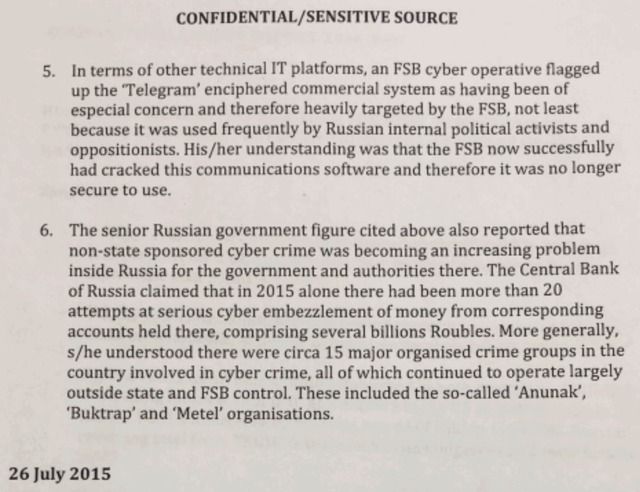
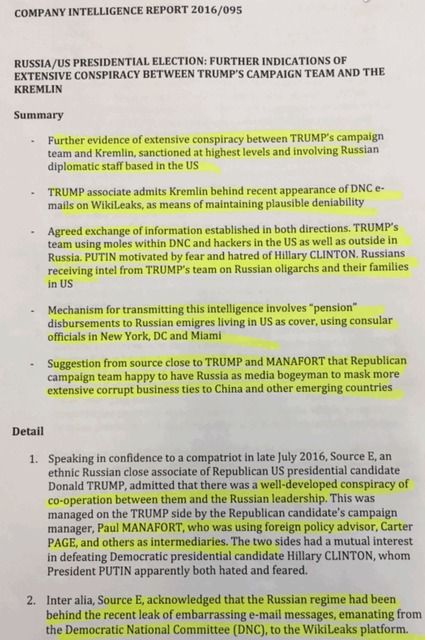
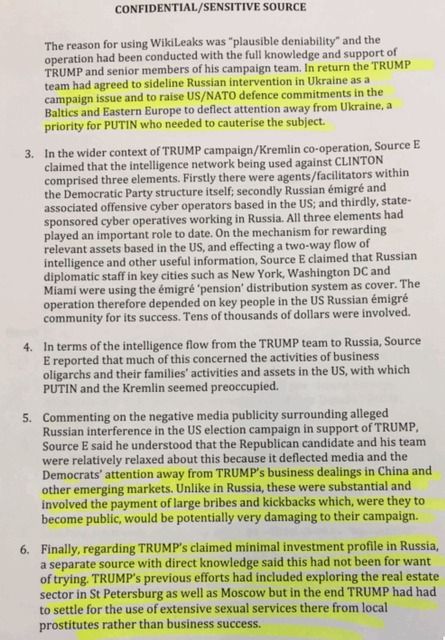
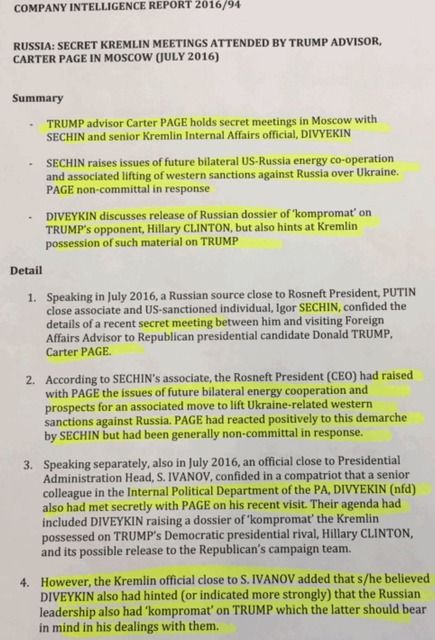
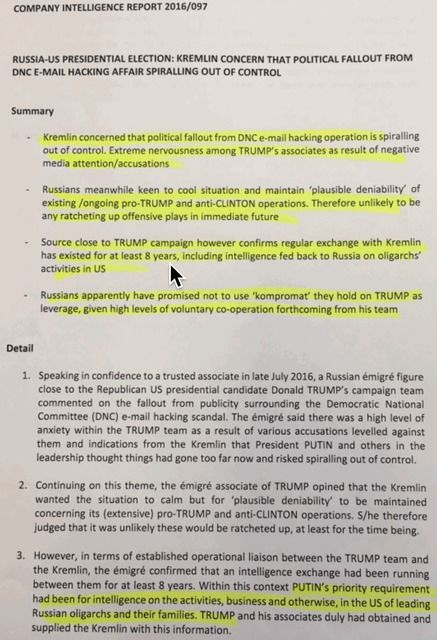
The former official who compiled the dossier works for a private investigations company and was hired by both Republicans and Democrats to investigate Mr. Trump, according to one official close to the matter. His reports have circulated for months among law enforcement and intelligence agencies as well as congressional offices and news outlets, including The Wall Street Journal. While U.S. agencies have been unable to verify the allegations, the former official who produced the report has a long and respected track record among intelligence officials. The Journal hasn’t been able to verify the allegations
“You possess explosive information about close ties and coordination between Donald Trump, his top advisors, and the Russian government,’’ Mr. Reid wrote. “The public has a right to know this information. I wrote to you months ago calling for this information to be released to the public.’’
Asked to comment on the revelation of the memos, a representative of Mr. Reid said his “letters and statements speak for themselves.”
On Sunday, Sen. Lindsey Graham (R., S.C.) suggested in a television appearance that the U.S. government was probing whether or not Russian operatives coordinated with people linked to U.S. political campaigns.
Asked on NBC’s Meet The Press whether there was such an investigation, Mr. Graham replied: "I believe that it’s happening. But you need to talk to them because I don’t want to speak for them.’’
http://www.wsj.com/articles/spy-agencie ... 1484101731
General Patton » Tue Jan 10, 2017 11:57 pm wrote:SLAD, this report getting released is the greatest self own the MSM and CIA have ever done on themselves. This is the digital Bay of Pigs.
BuzzFeed’s Bombshell
Why the site published the explosive memos about Trump and Russia—and why no one beat them to it.
By Will Oremus
BuzzFeed on Tuesday published a 35-page dossier comprising a series of memos, containing intelligence reportedly gathered by a former British intelligence agent as opposition research, about alleged ties between President-elect Donald Trump and Russia. It included claims that Russian authorities have been “cultivating and supporting” Trump for “at least five years” and obtained compromising material on Trump that included video of “perverted” sex acts in a Moscow hotel..
The dossier was not new. BuzzFeed and multiple other news organizations had obtained it well before Tuesday and had been investigating its various claims. Mother Jones wrote about it prior to the election, on Oct. 31, and published a handful of quotes from it. Key figures in Congress had also seen it and even publicly alluded to it, and the Guardian reported on Tuesday that Sen. John McCain had passed it to FBI Director James Comey last month. But no one had published its entire, stunning contents before Tuesday—partly because, as my colleague Joshua Keating put it, “nothing in the memos has been confirmed, and even their provenance is murky.”
BuzzFeed posted the dossier in full, prefacing it with a series of caveats about its veracity and updating it shortly afterward with a vehement denial from Trump’s attorney Michael Cohen, about whom the memo makes several claims. Why did the site opt to publish what so many others had opted not to? And why now, in particular? The answers point to a media industry that still takes its “gatekeeping” functions more seriously than it sometimes gets credit for—even if it doesn’t always perform them.
BuzzFeed’s editor, Ben Smith, explained the decision in a memo to his staff, which he subsequently provided to me and then published on Twitter:
Smith didn’t address why BuzzFeed waited until now to publish the document, and he declined to comment further for this article. But the move came almost immediately after CNN reported Tuesday that top U.S. intelligence officials had shown Trump and President Obama a two-page synopsis of the dossier. The synopsis was presented as an unofficial appendage to the classified security briefings they gave Obama and Trump about Russian interference in the presidential election, CNN reported. Sources also told CNN that the “Gang of Eight” Congressional leaders had been provided a synopsis of the dossier as well.
That top U.S. intelligence officials saw fit to brief Trump and Obama on the dossier would seem to indicate that they took the claims at least somewhat seriously, even though they’ve been unable to verify them and, as BuzzFeed noted, the memos contain some “clear errors.” But CNN’s report suggests that the briefing was partly just about making Trump aware that the dossier existed and was circulating at the highest levels of the U.S. government.
CNN declined to disclose the substance of the claims, writing, “At this point, CNN is not reporting on details of the memos, as it has not independently corroborated the specific allegations.” Smith and BuzzFeed saw it differently. It’s possible that if they hadn’t published it Tuesday night, someone else would have.
(Slate, for its part, followed BuzzFeed’s lead and published the dossier later Tuesday as part of Keating’s blog post about it. Asked why Slate ran it, Editor in Chief Julia Turner told me, “The memos BuzzFeed published today are newsworthy documents, and Buzzfeed’s decision to publish was news too. In covering BuzzFeed’s scoop and its implications, we described the allegations in the memos and the questions about their veracity; we thought it served our readers best to republish the documents as well so readers could evaluate the memos for themselves.”)
BuzzFeed was acting in a tradition in which the notion of media as privileged gatekeeper of information is viewed with disdain.
What we have, with the memo, is a set of explosive charges against the president-elect that no one so far has been able to either verify or fully debunk. What’s remarkable, in a time of social media, blogs, polarized politics, hacks, and leaks, is that the dossier stayed private for so long, even as the Clinton campaign and Democrats saw their private communications splashed across the news. No doubt that was due at least in part to the claims’ sensational nature and the enormous impact they could have, if verified or even just widely believed.
David Corn, the Mother Jones journalist who wrote the magazine's comparatively circumspect Oct. 31 report on the allegations, tweeted Tuesday night that he did not publish the full memos at the time because he could not verify their allegations. For Corn—and for journalist Julia Ioffe, who tweeted that she was “approached with this story” but turned it down because it was “impossible to verify”—that call came down to ethics and standard operating procedure. Clearly the internet has not turned journalism into a shameless, traffic-thirsty free-for-all.
Yet the dossier did come out eventually, and it’s interesting to reflect on how and why it happened—and whether it was inevitable. It happened via a series of steps by various actors, each of who relied on the actions of those before them to justify their own decisions. BuzzFeed presumably published it in part because CNN was reporting on it. CNN was reporting on it because intelligence officials had briefed Trump on it. Intelligence officials briefed Trump on it because senior Congressional leaders were passing it around. Senior Congressional leaders may have been passing it around in part because Senate Minority Leader Harry Reid alluded to it in a letter blasting FBI Director James Comey for publicizing information harmful to Hillary Clinton, but not publicizing the dirt on Trump. Each act lowered the bar for those who followed to act on information that they knew might or might not be true.
Whether BuzzFeed was right or wrong to publish the memo—and whether it should have presented it with more critical commentary or context—is a question that will be debated in future classes on journalism ethics. For now I’ll just point out that, while Smith has at times proudly positioned BuzzFeed as a member of the “mainstream media,” he was acting here in a different tradition. It was the tradition of internet media and blogs—one pioneered by Matt Drudge, who famously broke the Monica Lewinsky scandal by reporting that Newsweek was sitting on it, and by the now-defunct Gawker. It’s a tradition in which the notion of media as privileged gatekeeper of information is viewed with disdain. It’s one in which sensitive and embarrassing information about public figures is readily disclosed, ostensibly out of respect for the public’s intelligence and right to know. It’s also one in which publishers are rewarded for publishing such bombshells, not with prestigious industry awards, but with notoriety, page views, and social media shares.
Smith’s defense of his decision evinces an understanding of this tradition and BuzzFeed’s place in it. “We have always erred on the side of publishing,” he writes. There is virtue in this posture among journalists, insofar as it serves as a societal counterweight to the tendency of people in positions of power to suppress information that could embarrass them. The question is just how far you’re willing to err in that direction, and Smith acknowledges that this was a particularly close call. It rings just a tad disingenuous, however, when BuzzFeed claims to have published the documents simply “so that Americans can make up their own minds” about the allegations. If America’s top intelligence agencies, Congressional staffs, and investigative journalists—including BuzzFeed’s own decorated investigative team—couldn’t make up their minds about the allegations, how do they expect the average reader to do so?
That doesn’t necessarily mean BuzzFeed’s decision was wrong. It’s at least theoretically possible for such a disclosure to both violate traditional journalistic norms and benefit society in ways that transcend journalistic ethics altogether. A reader may have little to go on in trying to evaluate the claims’ veracity, but now that they’re public, evidence proving or disproving them may soon surface. But it’s also possible for the publication of incendiary allegations to backfire in ugly ways, not only for the figures involved, but for BuzzFeed and the broader media—especially if they turn out not to be true.
http://www.slate.com/articles/technolog ... nd_no.html
seemslikeadream » Wed Jan 11, 2017 2:11 am wrote:Anonymous @YourAnonCentral 3h3 hours ago
The story that the #GoldenShowers story is a hoax is in fact a hoax, the hoaxers are attempting to protect #Trump.
40 replies 282 retweets 501 likes
Users browsing this forum: No registered users and 28 guests